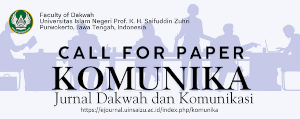RELASI ANTARA IDEOLOGI DENGAN MEDIA MASSA
DOI:
https://doi.org/10.24090/komunika.v1i2.797Keywords:
Ideology, Mass media, Mancism, Pluralistic liberalism, CriticalAbstract
The progress of mass media is influenced by the development of social theories. One interesting case to be discussed is the relation between ideology and mass media.There are three main groups which have different views on the relation between ideology and mass media. Marxist States that mass media is an institution which can be used to socialize false ideology built by borjuis class. Another group, the liberal pluralist, States that mass media is an institution which is free from interventions of State, political parties, and other repressing groups so that ideology has no relationship with mass media. The third, the critical group, States that texts produced by mass media is not free from any conflicts and interests. This group tries to rebuild the relationship between ideology and mass media.However, the ideology developed by this group is not an flght ideology or false awareness, but an ideology emphasizing on the articulation of meaning or ideology which functions as a discussion and logical social process.Downloads
Download data is not yet available.
References
Allam, Stuatr (Ed). Issues in Cultural and Media Studies. philadelphia: Open University Press. 1999.
Book, Cassandra L. (Ed), Human Communication: Principles, Contexts, and Skills, New York: St. Martin Press, 1980.
Boon, James, “Claude Levi Strauss, dalam Quentin Skinner (Ed), The Return of Grand Theory in the Human Sciences, London: University Press, 1985
Devito, Joseph A, Human Communication The Basic Course, edisi ke-5, New York: Harper Collins Publishers, 1991.
Effendy, Onong Uchjana, Ilmu, Teori, dan Filsafat Komunikasi, Bandung: PT. Citra Aditya Bakti, 2003.
Fiske, John, Introduction to Communication Studies, London: Mithuen, 1982.
Gurevitch, Michael dkk (Ed), Culture Society and the Media, London: Methuen & Co. Ltd., 1982.
Jeffres, Leo W, Mass Media Processes andEffects, Illinois: Waveland Press Inc., 1986.
JohnsonD.P., Teori Sosial Klasik dan Moderni, Jakarta: Gramedia, 1994.
Rahardjo, M. Dawam, “Topik Kitaâ€, dalam Majalah PramaNo. 6. 1985. Tahun XIV
Rivers, William L, dkk., Media Massa dan Masyarakat Modern, Jakarta: Kencana, 2003.
Thompson, John B, Kritik Ideologi Global, Yogyakarta: Ecisod, 2004
Book, Cassandra L. (Ed), Human Communication: Principles, Contexts, and Skills, New York: St. Martin Press, 1980.
Boon, James, “Claude Levi Strauss, dalam Quentin Skinner (Ed), The Return of Grand Theory in the Human Sciences, London: University Press, 1985
Devito, Joseph A, Human Communication The Basic Course, edisi ke-5, New York: Harper Collins Publishers, 1991.
Effendy, Onong Uchjana, Ilmu, Teori, dan Filsafat Komunikasi, Bandung: PT. Citra Aditya Bakti, 2003.
Fiske, John, Introduction to Communication Studies, London: Mithuen, 1982.
Gurevitch, Michael dkk (Ed), Culture Society and the Media, London: Methuen & Co. Ltd., 1982.
Jeffres, Leo W, Mass Media Processes andEffects, Illinois: Waveland Press Inc., 1986.
JohnsonD.P., Teori Sosial Klasik dan Moderni, Jakarta: Gramedia, 1994.
Rahardjo, M. Dawam, “Topik Kitaâ€, dalam Majalah PramaNo. 6. 1985. Tahun XIV
Rivers, William L, dkk., Media Massa dan Masyarakat Modern, Jakarta: Kencana, 2003.
Thompson, John B, Kritik Ideologi Global, Yogyakarta: Ecisod, 2004
Downloads
Published
2016-11-23
Issue
Section
Articles
License
Authors who publish with this journal agree to the following terms:
- Authors retain copyright and grant the journal right of first publication with the work simultaneously licensed under a Creative Commons Attribution-ShareAlike 4.0 International License that allows others to share the work with an acknowledgement of the work's authorship and initial publication in this journal.
- Authors are able to enter into separate, additional contractual arrangements for the non-exclusive distribution of the journal's published version of the work (e.g., post it to an institutional repository or publish it in a book), with an acknowledgement of its initial publication in this journal.
- Authors are permitted and encouraged to post their work online (e.g., in institutional repositories or on their website) prior to and during the submission process, as it can lead to productive exchanges, as well as earlier and greater citation of published work (See The Effect of Open Access).

























